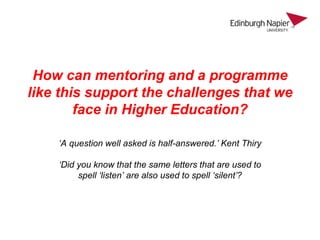
How can mentoring and a programme like this support the challenges that we face in Higher Education? - Jessica Dall
- 1. How can mentoring and a programme like this support the challenges that we face in Higher Education? ‘A question well asked is half-answered.’ Kent Thiry ‘Did you know that the same letters that are used to spell ‘listen’ are also used to spell ‘silent’?
- 2. Mentor Development Jessica Dall Development Partner
- 4. Objectives • What is mentoring at Edinburgh Napier? • Experiences of our mentors and mentees in the introduction of a mentoring programme • Growing a mentoring programme organically. • What has worked well • What would have been better if? • Next steps and supporting the challenges we face
- 5. University benefits • Professional - Career growth • Inclusive - Knowledge exchange and development •Innovation – sharing and developing ideas • A development opportunity that forms part of the IiP ethos • Staff retention • Employee engagement
- 6. Mentor benefits •Analyse own behaviour •Create a new mindset for themselves •Examine own skills and working practices •Become more self-aware •Develop effective feedback and people development skills •Find out about other parts of the organisation
- 7. Mentee benefits • Individual recognition, encouragement, and support • Increased self-esteem and confidence • Confidence to challenge oneself to achieve new goals and explore alternatives • A different perspective of the workplace • Advice on how to achieve the qualification/ undertake their development
- 9. Mentoring – what is it? • What is it? • How does it differ from coaching? • David Clutterbuck is one of Europe's most prolific management writers and thinkers. He heads the UK research committee of the European Mentoring and Coaching Council. • Some thoughts on benefits and what mentoring is: http://www.youtube.com/watch?v=vPxm94DDtYA
- 10. Mentoring Definitions • "Mentoring involves primarily listening with empathy, sharing experience (usually mutually), professional friendship, developing insight through reflection, being a sounding board, encouraging" - David Clutterbuck • “Mentoring is a supportive learning relationship between a caring individual who shares knowledge, experience and wisdom with another individual who is ready and willing to benefit from this exchange, to enrich their professional journey". - Suzanne Faure
- 11. Mentoring: what it is and what it is not • It enables one person to help another achieve their potential by sharing experience, listening and guiding. It is a one to one relationship between mentor and mentee based on trust, confidentiality and equality. • Many processes similar to coaching but delivered by individuals with different qualifications and different relationships with their client.
- 12. Mentoring: what it is and what it is not Mentoring •More long-term and takes a broader view of the person •Focus is on career and personal development •Can be more informal and meetings can take place as and when the mentee needs some advice, guidance or support •Relationship can last for a long period of time Coaching • Short-term (sometimes time- bounded) and focused on specific development areas/issues •Focus is generally on development/issues at work •Generally more structured in nature and meetings are scheduled on a regular basis •Generally has a set duration
- 13. Aims of the mentoring process at Edinburgh Napier Facilitate and enhance development of the mentee in their development programme and career.
- 14. Aims of the mentoring process at Edinburgh Napier Suggested time involved: Development requirement Frequency Session Duration Prep and review time SVQ Every month (progressing to every 2 months) 1 hour 30 mins before and after New professional services/ line managers Every 6 weeks 1/1.5 hours 30 mins before and after Current professional services staff/ line managers as part of ENable development programme Every 6 weeks 1/1.5 hours 30 mins before and after
- 15. The mentoring process at Edinburgh Napier Application form completed, signed off, sent to CLD Matching activity by CL&D Chemistry/ gel meeting Mentoring agreement and objective setting Mentoring meetings Mentoring Review Mentoring review
- 16. Listening to understand Reflecting Paraphrasing Summarising Asking questions that raise awareness Making suggestions Giving feedback Offering guidance Giving advice Instructing Telling Mentoring Directive Non-Directive / Supportive PUSH Solving someone’s problem for them PULL helping someone solve their own problem
- 17. Evaluating the mentoring programme • Mentor and mentee – start, middle and end • Mentor – 2 action learning sets a year • Mentee – check up e-mails
- 18. Growing the programme • Development programmes – SVQ and Grad Trainees • Enable your career – development advisory group (mentors and mentees) • AUA – mentors and mentees • Talent – mentors and mentees • Review and audit of all mentoring activity
- 19. Our experiences
- 20. Our thoughts so far What’s worked well What would have been better if Mentor and mentee engagement 1st set of mentees having been mentored themselves Matching Setting up a more robust recording system straight away Starting small and growing Making more people across the organisation aware of the programme Auditing all mentoring undertakings This had been done earlier so all processes were the same Action learning sets A coaching audit being completed at the same time Having a robust process of mentees being accepted An agreed approach to coaching and mentoring Having a robust process of mentors being trained, supported, paperwork Continuous development being more available - time
- 21. Next steps • Review feedback on additional relationships added to programme – June 2015 • Audit coaching activity – June 2015 • Both brought in line – process, training, overall approach • Mentoring hub • Review of admin • Grow how mentors developed
- 22. Further information and questions Business Balls: http://www.businessballs.com/traindev.htm#mentori ng Jessica Dall: 0131 455 5041or j.dall@napier.ac.uk Corporate Learning and Development: 0131 455 5036 or corplearningdevelopment@napier.ac.uk
Notes de l'éditeur
- (50 seconds- 1min 30)
